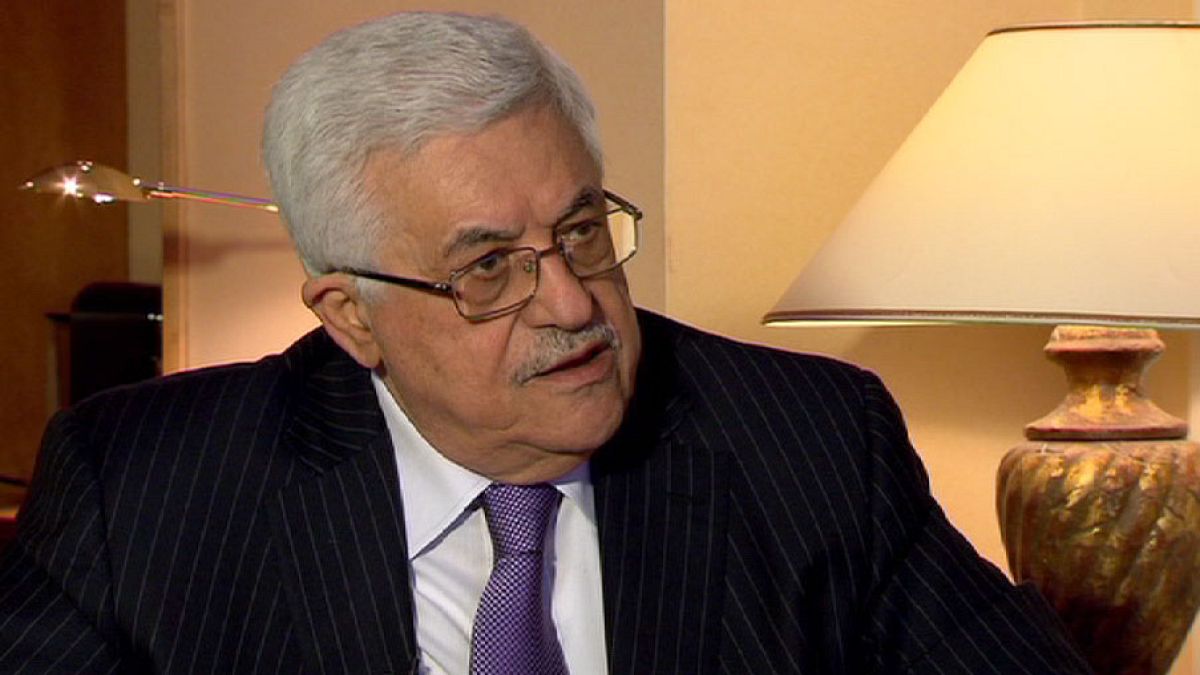Palestinian Authority President Mahmoud Abbas, in an interview with euronews, has made clear that he will not be deterred by American opposition to his moves toward statehood. His strategy is to garner international recognition, in order to force Israel to acquiesce.
Both Israel and the US objected to the admission of Palestine on October 31 to UNESCO. Euronews spoke with Abbas during his recent visit to further his cause in Brussels.
Charles Salamé, euronews: “Mr President, if we could begin with a word about Palestine joining UNESCO.”
Mahmoud Abbas:
“Palestine’s membership in the United Nations Educational, Scientific and Cultural Organisation represents a lot, politically and morally, since we have asked the Security Council to let Palestine be a member of the United Nations, and this request still stands. At the same time, we wanted to be in UNESCO, which is a very important organisation, as it has close relations with people all over the world.”
euronews: “The United States has suspended its financial participation in UNESCO.”
Abbas:
“The US was against our adhesion to UNESCO not for any convincing reason. What reason was that? They said that since 1989 there has been a law which forbids the United States from participating financially in organisations that deal with terrorism. We responded that we don’t think we are terrorists, and that if this qualification could be attributed to us 22 years ago it cannot be today.
“The proof is that Palestine has political and economic relations with the US, which is a member of the four-part commission, but its answer was that it is an old law that it cannot change. It is clear that this is an unjustifiable position, which is to say it is illogical for them to say that relations are broken for an unreal reason.”
euronews: “What news is there about dialogue with Hamas?”
Abbas:
“Around one month ago, I had talks with (Hamas leader) Khaled Meshaal, and we laid down the basis for an eventual agreement. Firstly, Hamas has come around on the following points: peace and calm must be established in Gaza as in the West Bank; resistance must be population-based and not with weapons — frankly, this was a point we agreed on; the solution is a state based on the 1967 borders — there again Hamas agreed; then there is the organisation of legislative elections on 5 May, 2012.
“These points need some sort of a follow-up, and this will begin on 18 December, with an important focus on the PLO, which is to be on how all the Palestinian organisations are going to participate in the Palestinian Liberation Organisation, which has statutes and commitments; a movement that wants to join the PLO has to accept these engagements. That is what is going to be discussed on 18, 20 and 21 December in Cairo.”
euronews: “This Sunday, Israel is going to free Palestinian prisoners. What do you expect next?”
Abbas:
“What happened is that the soldier Shalit was kidnapped, negotiations for his liberation lasted for five years, and a deal was reached between Hamas and Israel, with Egyptian mediation. At times Germany intervened, to set the number of prisoners to be exchanged. There were 1,027. Four hundred were to be let go in a first phase and the rest in a second phase.
“But I had made an agreement with the former Israeli prime minister Ehud Olmert: when Shalit was set free, Israel would free as many prisoners for the Palestinian Authority as were covered under the deal with Hamas.
“Netanyahu condemned this agreement. Even President Obama stepped in around a year ago, and he told me he would talk to Netanyahu about freeing prisoners, and that is what he really did, informing me that Netanyahu had accepted. I responded ‘the same goes for me’, and then it was all forgotten.
“So, the prisoner question is not only solved through good will but also by transactions and attempts, or pressure coming from one source or another.
euronews: “An unavoidable question on the situation in the Middle East region as a whole is what is happening in Syria. What impact do events taking place in Syria have on Palestine?”
Abbas:
“The official point of view is that we are not involved. We are not getting mixed up in what is happening. But we do state our respect for the will of the people, we approve of what the people are asking for; but we observe, and we do not step in, whether it is in Tunisia, in Egypt or Syria. We are watching the Syrian events, no more. And of course we feel sorry for the victims and those killed, and about what we learn about the incidents and the trouble. But our position is as I have explained.”
euronews: “One last point, President Abbas: you met French President Sarkozy in Paris, and the President of the European Council, Van Rompuy, in Brussels, and Iceland has recognised the Palestinian state with the 1967 borders…”
Abbas: “We are a people under occupation; we claim our independence; we believe in peace; we believe in international legitimacy; we practise the culture of peace in our country; we complete institutions; we have had positive declarations from the international central bank and donors, who say that our accounts are transparent and that this transparency is not found in many countries. So, what are we missing? The main problem is that Israel refuses and the United States approves, and we are always in negotiation to convince them that peace is not only in the interest of the Palestinians but also the Israelis and the region, internationally. Therefore pressure must be brought on those who refuse, and who stand in the way of peace. I say to them: ‘Here is our position. Frankly and clearly, tell me where my mistake is, and I am ready to correct my error.’ But they don’t find any error.”
